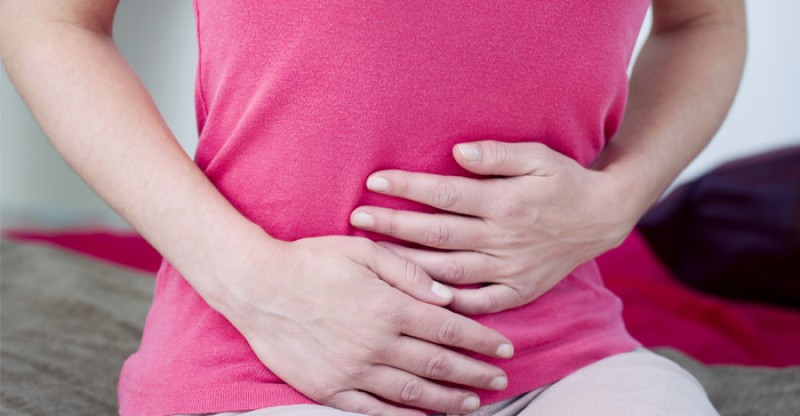17 Evidence-Based Natural Ways to Deal with Bloated Stomach
What is Bloating
Bloating is any abnormal general swelling or increase in the size of your abdominal area.
As a symptom, the patient feels a full and tight abdomen, often feeling swollen after eating (1).
The most frequent cause of bloating is excess gas production and/or disturbances in the movement of the muscles of the digestive system (2).
The feeling of excessive pressure in the abdomen can cause increased discomfort and sometimes make the stomach appear bigger (3).
The effect of bloating can be extreme in certain cases, leading some to use the term “food baby.”
Although somewhat similar, bloating and water retention should not be used interchangeably because both the causes and symptoms are different.
To put it simply, bloating involves excessive amounts of solids, gas, or liquids in the digestive system, but some people suffer from bloating mainly because of their increased sensitivity.
You are overwhelmed with a sensation of increased pressure in the abdomen, although your belly is completely fine (4,5).
About 16%–30% of people report they experience bloating on a regular basis, meaning the medical condition is very common (6,7,2).
Bloating often causes discomfort and pain, but it can also make you look heavier and give the perception of large amounts of belly fat.
Even though bloating is occasionally caused by a serious medical condition, the most common causes involve diet and certain foods or ingredients that people may not be able to tolerate.
How to Deal with Bloating Stomach
Do Not Eat Large Portions
Feeling bloated or having a “stuffed” stomach can often feel the same, but it is unnatural to overeat and feel comfortable.
You can avoid such feelings by not overeating and eating smaller portions.
Keep in mind, however, that you do not have to starve yourself—just eat less than before.
Eating smaller meals and more often is a good way to start (8).
Going from three meals a day to four or five and still eating about the same amount will easily help you feel better after each meal, simply because you are not trying to digest too much food at one time.
Moreover, not only will it ease the pain in the abdomen, but you will also feel more energized (9).
In spite of the absence of feeling an increased pressure in the abdomen or an enlarged abdomen, a subset of people still experience bloating, and the reason is mostly sensory (10,11).
Those people may eat smaller portions, but they will still experience discomfort in their belly.
Accordingly, chewing your food better can have a two-fold effect.
It reduces the amount of air you swallow with the food, and it also makes you eat more slowly, which is associated with smaller portions and reduced food intake (12).
Eliminate Carbonated Beverages
Aside from their delicious taste, heavily carbonated beverages are not healthy.
Bubbles of carbon dioxide found in carbonated beverages and that extra air in your stomach can cause serious bloat (13).
One of the major causes of bloating is gas, which can be produced in your body, and also gas that you can swallow.
One is carbon dioxide, a major offender that contains high amounts of soda in carbonated beverages, including carbonated water (14).
Be Mindful About How You Eat
Two sources of gas are present in the digestive system: one being gas that is produced by bacteria in the gut and the other being gas or air that is swallowed when you drink or eat.
Besides carbonated beverages, drinking through a straw, chewing gum, and talking while eating or when in a rush can also lead to swallowing excess air without even realizing it (15).
We offer these tips:
- Lose the straw: You either don’t use a straw or make sure you do not breathe through your nose while drinking through a straw. Also, do not drink and breathe at the same time (16).
- Stop chewing gum: Chewing gum is an easy way to swallow extra air, so you should cut back on gum if you have problems with bloating.
- Eat slowly: Keep your mouth closed to avoid swallowing extra air. Also, listen to your mother and do not talk while having food in your mouth (17).
Do Not Exercise Right After Eating
Have you ever hit the gym right after a meal and it upset your stomach?
That happened because your body is designed for working OR resting, not both at the same time.
If you do not allow enough time for your body and stomach to rest and settle, you will probably experience digestive problems, leading to discomfort and gas (18).
Working is for physical activity; resting is for digestion.
After a meal, your body tries to digest food, but switching to the “grind mode” with a workout routine or run disturbs the digestive process.
In such a case, you kill two birds with one stone—reducing your ability to exercise effectively and making your stomach and bowels upset.
Consequently, be sure to give yourself and your stomach enough time to rest so that you can digest properly.
An hour or two after eating and before exercising is enough.
Beware Of “Sugar-Free” Products
Sugar alcohols are commonly found in chewing gum and sugar-free foods.
Even though these sweeteners are generally considered to be safe alternatives to sugar, you should avoid them because they cause digestive problems, tending to reach the bacteria in the large intestine, which digest them and produce gas (20).
By consuming these products, you are limiting their effectiveness, making it harder for your digestive tract to push food through, thus causing diarrhea (21).
Always check the nutrition label of “sugar-free” foods to see if the following ingredients are included: sorbitol, mannitol, xylitol, and erythritol.
Sugar alcohols are also included in FODMAP foods. For that reason, you should avoid “sugar-free” products.
They are also known to cause many negative health effects, including undesirable weight gain, heart disease, and insulin resistance.
Balance Your Sodium and Potassium Levels
High fluctuations in sodium intake can lead to bloating and water retention.
Inadequate potassium intake can cause similar health issues (22).
To avoid these problems, you should maintain a proper balance and stable intake of both sodium and potassium.
According to some research, an adequate intake fluctuates between 1.5 and 2.3 grams of sodium and 4.7 grams of potassium per day (23).
If you are physically active, you need more of these elements, so consider an intake of about 3 to 4 grams of sodium and about 5 to 6 grams of potassium per day.
Take stock of your daily sodium intake, consider your personal needs for sodium, and apply these ways to reduce it:
- Don’t eat prepackaged or canned foods
- Don’t eat processed meats, such as hot dogs
- Don’t eat deli meat
- Limit your use of spices and table salt
- Check the labels of any sauces and salad dressings
Cutting back on these foods may be annoying, but if you want to avoid problems, you might want to follow these steps.
Cook Your Vegetables
Vegetables are excellent for your overall health in so many different ways, but they are packed with insoluble fiber.
This compound helps food pass through the digestive system more easily, but your body finds it difficult to break down insoluble fiber, often leading to bloating and gas.
To solve the problem, you should cook your vegetables more often.
Cooking softens the fiber content in vegetables, making it easier for digestion without the associated gas.
You probably know that cooking vegetables removes nutrients that are heat sensitive or water soluble, but to avoid the problem of removing nutrients, you can always stir-fry or steam your vegetables.
In case you have to boil vegetables in water, you can make the most of it by using the leftover water in a stew or soup to recover those nutrients.
Eat Plenty Of Fiber
In most cases, bloating and gas are the result of constipation (27), which is one of the most common digestive issues, and most solutions include eating more fiber.
Fiber helps food pass through your digestive system and relieve constipation (28).
Soluble fiber is the best choice you can make because it is the type of fiber that is easily absorbable.
It also retains water but in a good way, helping reduce and relieve the symptoms of diarrhea.
Make Sure You are Not Constipated
Constipation is known to exacerbate stomach bloating symptoms, but causes may vary (29, 31).
When you mention constipation, most people will associate it with inadequate fiber intake, but some research proves them wrong (32).
In fact, increased fiber intake can exacerbate symptoms of bloating, whereas reduced fiber intake can alleviate constipation (33, 34).
You may turn to laxatives, but you should first try the physical activity and magnesium supplements (35, 36, 37, 38, 39).
Rule Out Allergies and Intolerances
If your body is intolerant or allergic to a particular food, that could easily manifest as gas or bloating.
Some common allergies and food intolerances include grains (gluten and other grain proteins), dairy products (lactose), nuts, eggs, and seafood.
If you have been experiencing gas or bloating, you might want to cut down on one or more of these food types.
If you notice that your symptoms lessen or even disappear, it is highly likely that you have an allergy or intolerance, meaning you should reduce or completely remove that food from your diet.
To summarize, consider these common foods and ingredients that you might have an intolerance for or be allergic to:
- Lactose: According to some research, approximately 70% of the world’s population cannot properly digest lactose, which is the main carbohydrate contained in dairy (40, 41). Also, lactose intolerance is linked with many digestive symptoms, including bloating.
- Fructose: Some research has indicated that fructose intolerance can lead to bloating (42).
- Eggs: Gas and bloating are common symptoms of egg allergy.
- Wheat and Gluten: Many people cannot tolerate gluten or are allergic to wheat, which can cause many adverse effects on digestion, including bloating (43, 44).
Have no worries, though, about removing these foods completely, since safer and healthy alternatives are available.
For example, you can substitute soy or almond milk for dairy milk if you are lactose intolerant.
Also, if you have a gluten intolerance, you can eat gluten-free products, such as pasta, bread, and cereals.
If avoiding these foods does not help and you strongly suspect you have a food intolerance or allergy, see a doctor.
Find Out if You Have Irritable Bowel Syndrome
Irritable bowel syndrome is considered the most common digestive disorder in the world, affecting about 14% of the population, most of whom go undiagnosed (45, 46).
IBS symptoms include constipation, bloating, diarrhea, abdominal pain, and cramping.
Sixty percent of people with IBS report bloating as the worst of their symptoms (47).
The causes of IBS are still unknown, but some research has concluded that it might be certain types of carbohydrates that people cannot digest (48).
These carbohydrates are known as FODMAPs, which can lead to IBS symptoms in some people, including bloating.
For that reason, people with IBS should avoid foods with “indigestible carbohydrates,” the so-called high-FODMAP foods.
The problem with FODMAPs is similar to the problem with lactose—the molecules end up in the intestine, remaining undigested, where bacteria ferment them, resulting in gas and bloating.
Fortunately, there are natural ways to treat IBS, which do not include medical procedures or heavy medications.
What’s more, all you have to do is make some dietary changes.
To be sure of what you can and cannot eat, you should know which foods contain FODMAPs.
Here are some common high-FODMAP foods:
- Garlic
- Orange juice
- Grains such as barley, wheat, and rye
- Beans
- Dairy milk
- Cream cheese
- Most teas
- Sausages
- Onions
- Egg noodles
- Watermelons
- Apples
- Soybeans
The full list of high-FODMAPs foods is really extensive (49).
In case you are sure you suffer from IBS, do your own research before grocery shopping.
Take Digestive Enzyme Supplements
In some cases, dietary changes you make do not lead to results or are too difficult to follow.
In those cases, it is worth looking into certain over-the-counter products that can be useful in terms of improving your digestion to lessen bloating and gas.
You can look for two specific types: digestive enzymes and probiotic supplements.
Digestive enzyme supplements break down hard-to-digest foods, including those high-FODMAP foods mentioned above.
You can buy several types of enzyme supplements:
- Lactase breaks down and helps digest lactose (50).
- Amylase helps digest starches (51).
- Protease helps digest proteins.
- Beano contains the enzyme alpha-galactosidase and helps break down indigestible carbohydrates.
Also, multienzyme supplements are available as well as their single counterparts (53).
Therefore, determine which foods you are having trouble digesting, and consider taking supplements with the specific digestive enzymes to eliminate these troublemakers.
In many cases, these types of supplements provide almost immediate relief.
Take Probiotics
The above-mentioned over-the-counter products include digestive enzymes and probiotic supplements.
Probiotic supplements help the natural bacteria function properly in your digestive tract (54).
According to several clinical studies, certain probiotic supplements can help reduce both gas and bloating in people with digestive problems (55, 56).
If the bacteria are not functioning properly or if you do not have enough good digestive bacteria, the food you consume will not be digested properly, meaning you will feel gassy.
That feeling of gassiness produced by the bacteria in the digestive system is a major contributor to bloating.
Other studies, though, have concluded that probiotics help reduce gas but not symptoms of bloating (57, 58, 59).
The bacteria in your intestine can vary between individuals, as there are many different types.
Based on this fact, the effects of probiotics may depend on the individual.
Use a Food Journal to Keep Track of Your Issues
We are all different, and so are our bodies.
What causes problems for one person may not necessarily cause problems for someone else.
The rule is the same for bloating or gas.
At the same time, there are many potential sources of your bloating issues.
Keeping a food journal is an easy and quick way to keep track of your daily eating regimen, pinpoint foods that cause bloating or gas, and show you how to change your diet accordingly (60).
Write down any symptoms you have and the times you experience them.
This will help you tie them to specific foods you ate.
You will probably notice that some common foods often labeled as “bloating foods” are not really a problem for you, whereas some less common ones actually are.
What’s more, you may also realize that there is no need to massively overhaul your diet to get rid of gas and bloating.
Nonetheless, use a journal to get to the heart of your diet challenges, and then make changes accordingly.
Reduce Stress
If you have been calorie deficient for some time or if you are exercising too much every week or if you are dealing with large amounts of mental or physical stress, it is highly likely that your cortisol levels are too high.
Cortisol is a stress hormone that can negate all the good work you have done, sometimes leading to gas and diarrhea.
There is a good chance, though, that stress may not be the sole reason for your bloating struggles.
Reducing stress is beneficial to you beyond reducing gas (63).
To eliminate stress from your daily life, try to have a clear mind and stay calm in stressful situations.
Doing this will help you more than just your bowels.
Do Not Bother with Natural Diuretics
When you surf the Internet searching for “foods that reduce bloating,” most results mention foods that will give you a flat, sexy belly.
The most common recommended foods include celery, asparagus, bananas, olive oil, leafy greens, and various high-fiber foods.
Unfortunately, there is no scientific proof that any food can reliably reduce bloating.
Alcohol is known to have diuretic effects, but regular drinking is not going to help you in the long term (64).
Caffeine is also an effective but milder diuretic, but one study shows that the fluid ingested with caffeine more than makes up for any water loss (65).
Use Peppermint Oil
Another cause of bloating may also be an altered function of the muscles in the digestive tract.
Drugs called antispasmodics have been shown to be useful for reducing muscle spasm (66).
Peppermint oil is a natural substance that has a similar function to these drugs (67).
According to many studies conducted on peppermint, it has been shown to reduce various symptoms in IBS patients, including bloating (68, 69).
Precautions
Regarding bloating and gas, self-diagnosis is sufficient, as you can target the causes of your gas and bloating troubles in many different ways.
Once you have found the causes, you are ready to make the necessary changes in your diet and lifestyle to eliminate them.
If your problems persist, however, and will not go away, it is advisable to see a doctor.
If your dietary changes do not do the expected work and your symptoms are becoming severe, you may be dealing with a chronic condition that goes beyond your life choices.
Bear in mind that diagnosing digestive problems is not an exact science and can be very complicated.
So, turn to an expert, which can be of great help to you.
Conclusion
Stomach bloating and gas can be horribly frustrating, especially if you are fully aware of your diet and allergies.
By using the strategies explained in this article, you will most likely reduce the chances and symptoms of these two irritating medical conditions.
Plus, you will get that flat belly and thin skin you have always wanted.
FDA Compliance
The information on this website has not been evaluated by the Food & Drug Administration or any other medical body. We do not aim to diagnose, treat, cure or prevent any illness or disease. Information is shared for educational purposes only. You must consult your doctor before acting on any content on this website, especially if you are pregnant, nursing, taking medication, or have a medical condition.
HOW WOULD YOU RATE THIS ARTICLE?







Hi…How long does it take for probiotics to alleviate the symptoms of bloating????
Hi Anna! It depends on many factors like genetics, the state of your gut system, eating habits, and the stress you may experience. For better results, you should consult your doctor and he/she can tell you how long you should take probiotics.
How much time should I wait after the meal before I exercise to avoid bloating?
Which of these recommendations can be applied for my 10-month-old baby? I just don’t want to give her pills.
How do I need to use peppermint oil to fight bloating? Should I add the oil to my salad as a dressing? Or I can drink peppermint tea?
Is it true that chewing gum can cause bloating? Sounds reasonable as you write that sugar-free products should be avoided and most gums are claimed sugarless.
Nice article